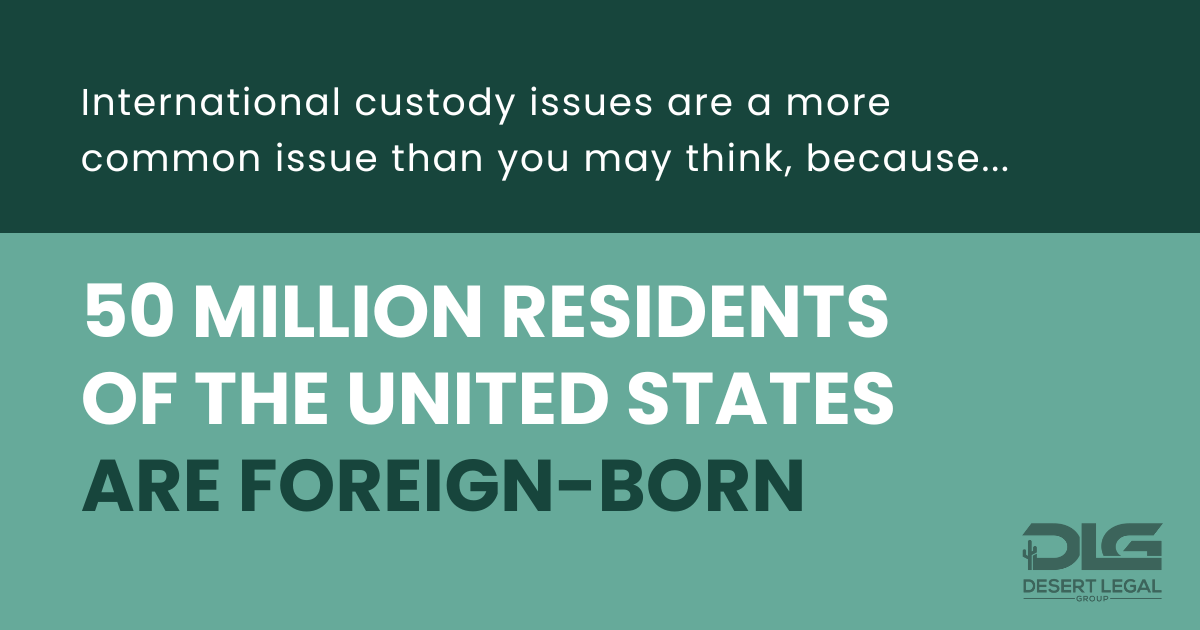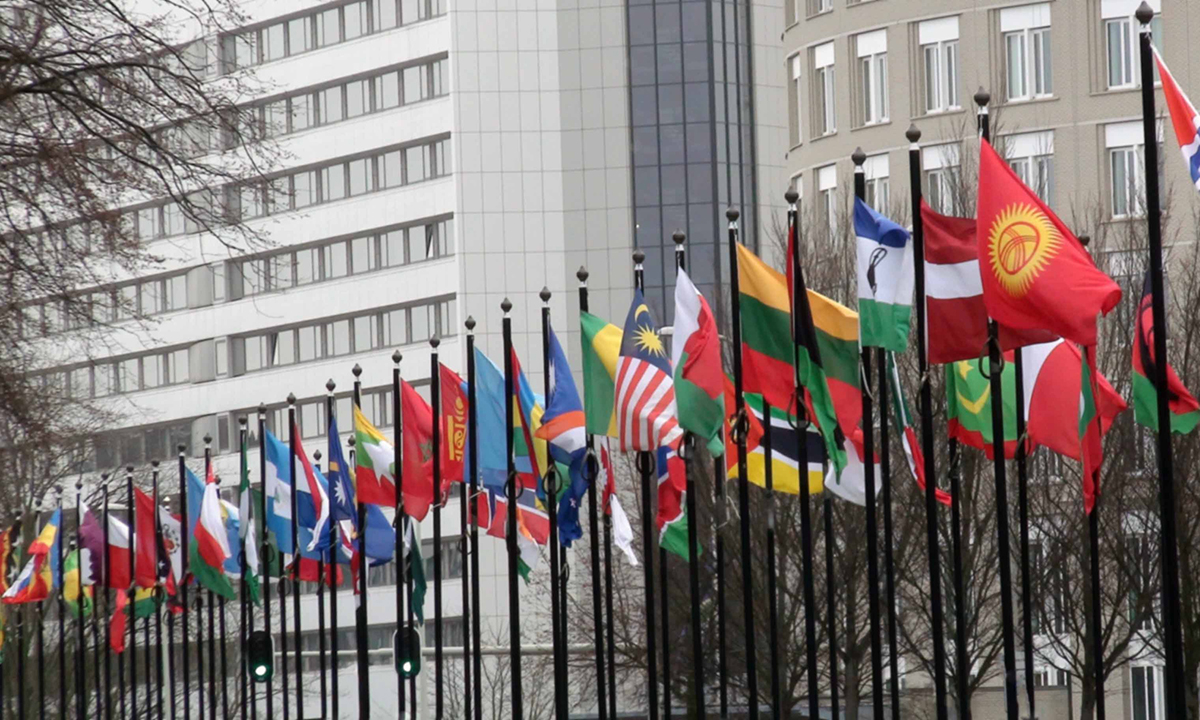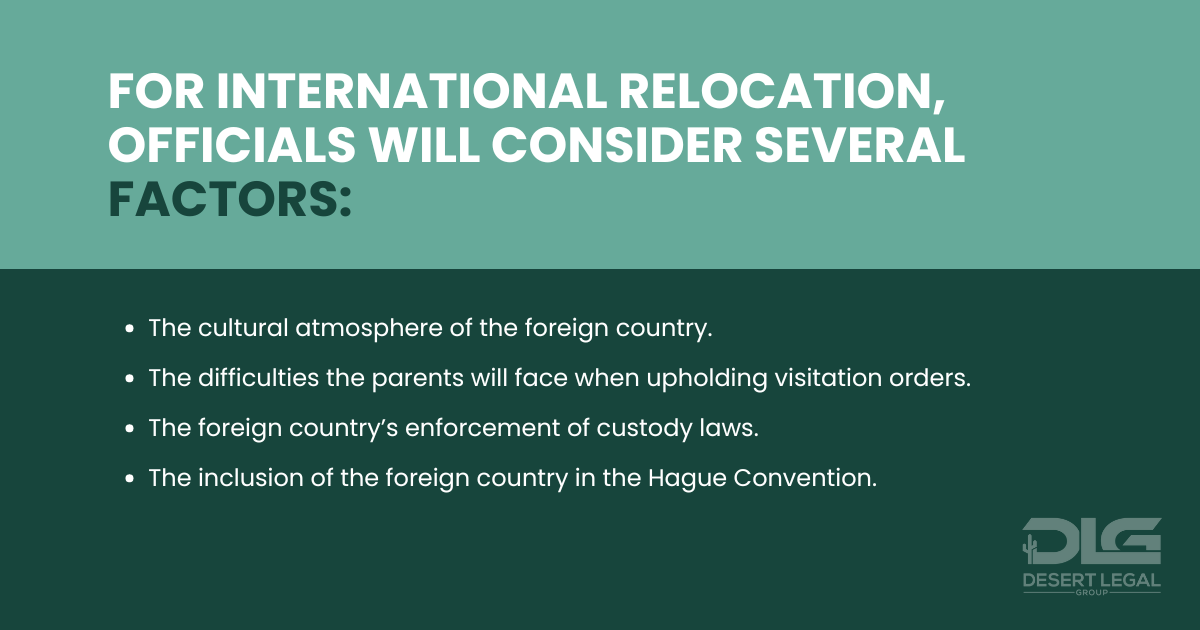To most of us, the world no longer seems as big as it once did. Through technology and travel advancements, people are finding new ways to not only explore the world but are also more willing to live and work in locations that may have once seemed out of reach. In much the same way, not every family unit looks the same, with parents and children sometimes spread across the globe. However, with divorces occurring in approximately 40% of marriages, many of them with children, more and more families face the challenges of what living internationally may mean for their family.
The decision to live or travel internationally for one parent who shares the responsibilities of raising a child with another can bring about many complicated circumstances. Parents are obligated to uphold the court-ordered resolutions for child custody, whether they share parenting duties after divorce or were never married. International travel or relocation while a custody order is in place can raise many legal issues.
While agreeing to uphold a custody order during international travel or relocation is the expectation, unfortunately, many people violate their orders, whether by accident or intentionally. From keeping a child in a foreign country and refusing to return them or moving the child along with a military parent, there are a number of situations you may face. Knowing how to confront international child custody disputes could help assuage your worries and fears.
International Child Custody Laws
International custody issues are a more common issue than you may think, because the United States is composed of people from various backgrounds. In fact, nearly 50 million residents are foreign-born.

The country’s connections to other parts of the world are tremendous, leaving a significant amount of opportunity for international custody disputes. Should you be confronted with a custody dispute internationally, here are some laws to know and understand.
Jurisdiction
Establishing jurisdiction will identify the exact laws your case will need to abide by. While you may wish to file your claim in a United States Court, the country in which your child resides currently may not recognize the laws of the United States in such cases. Therefore, you may need to then file a claim in the country where your child is physically located. However, international law may be on your side, thanks to the Civil Aspects of International Child Abduction, which is a treaty designed to help return a child to their home country. This law is the result of the Hague Convention.
The Hague Convention
This international treaty was signed by a number of countries, all of whom agree to the terms of a treaty that states that a child under the age of 16 must be returned if a parent violates a court order and removes the child from their home country unlawfully. This treaty is designed to protect children from international crimes against them, such as abduction, trafficking, and more. It does so by putting processes and procedures in place to help prevent or fight against potential harm to a child.
Terminology within the treaty helps to clarify both jurisdiction and the initial intention of the parents.

Within the treaty, it defines jurisdiction in cases where there is no existing court order. In these situations, jurisdiction falls back to the child’s home country. The treaty also contains terms for defining the wrongful removal or retention of a child. This occurs when a parent violates a custody order granted by the place of residence through the removal of the child from that location or any actions that prevent them from returning to that location.
Additionally, the treaty defines how court documents must be filed and served internationally.
To help clarify the Hague Convention, it is important to understand that the treaty defines a child’s home country by referring to it as their habitual residence. To determine this, it looks at any shared intention of the parents, the history of where the child lived, including any schools they attended, and any facts as to the history of the family and where they are determined to be settled.
Uniform Child Custody Jurisdiction and Enforcement Act
Child custody orders, whether domestic or international, can only be modified by petitioning the court and receiving a new order. When international custody orders need to be modified, the modifications must be filed under the Uniform Child Custody and Enforcement Act. Jurisdiction in such filings belongs to the child’s home state and could override an international custody order if it is determined that jurisdiction should fall within the United States.
Complications With US Custody Orders
Not every country around the world abides by the Hague Convention treaty. This can raise serious complications if a parent removes a child from the US and visits or resides in one of these countries. In these cases, regardless of the standing custody or support orders established in the US, the country in which the other parent now resides may choose to ignore this order and will not require that parent to comply.
With the help of an international law attorney, you can more easily navigate these complications, particularly when disputes over jurisdiction arise.
Navigating International Custody Disputes
Whether you are looking to prevent an international custody dispute from arising or you are faced with the reality that a case is imminent, there are several steps you should take with the help of your attorney.
Be the First To File
One of the best steps you can take if you are planning to travel or move with your children outside the country, or you are afraid the other parent will, is to contact an international family law attorney prior to the filing. By doing so, you can file preventative measures to ensure you are not accused of abduction. Or, these measures can help you ensure that the child’s other parent is prevented from abducting the child by traveling or moving internationally.

In general, if you file first, it is easier to claim jurisdiction should a problem arise. This can ensure you are open to more legal options.
Preventing Child Abduction
International child abduction occurs when a parent purposefully takes a child to a country other than the child’s country of residence in direct violation of a custody court order.
If you are worried the other parent may engage in such behaviors, consider the following steps:
- Prevent the other parent from traveling internationally with the child by petitioning for a court order.
- Advise law enforcement of abduction possibilities along with copies of any preventative court orders.
- If you believe your child has already been abducted, work with law enforcement to place the child’s information on the missing person’s list through the National Crime Information Center.
- Notify law enforcement agencies where international travel may occur, such as airport police or even directly with relevant airlines.
While these steps cannot guarantee you will prevent child abduction, securing a court order prior to contacting law enforcement can certainly help should a problem arise.
Understand Custody Laws Between Countries
Understanding how the laws of both countries work is essential when determining how to handle custody disputes. If, for example, a child has dual citizenship, the custody laws in one country may be more favorable than in the other country. In this case, it may be more beneficial to file any dispute claims in that country.
Dual-citizenship children face a new set of challenges with their parents, particularly when each parent may claim separate countries of residence. Unlike living in different areas of the same country, international travel to uphold visitation orders or find the financial resources to ensure that travel between both parents is possible but can be extremely difficult. It is important to ensure that court orders exist strictly outlining who may take the child where, when the child must be returned, and under what circumstances.
Relocating With a Child the Right Way
For parents who share a child and are either unmarried or divorced, relocation to a foreign country is not impossible. However, it does require more than just creating an agreement with the other parent. Legal obligations are required to ensure that the move is protected by law. By seeking court orders to define the terms of an international relocation or international move-away case, parents can avoid legal disputes later.
While the court is determining whether or not to allow an international relocation, officials will consider several factors in addition to the local laws of the country in which residence already exists.
These factors include:
- The cultural atmosphere of the foreign country, including any cultural practices that the child may be exposed to.
- The difficulties the parents will face when upholding visitation orders.
- The foreign country’s enforcement of custody laws and whether the non-custodial parent will lose any rights to enforcement because of it.
- The inclusion of the foreign country in the Hague Convention, though if a country is not included, it will not automatically eliminate the potential for relocation.

If you are faced with the decision of whether you should relocate to another country with your child, it is important to seek the help of a qualified international family law attorney who can guide you through the process of legally relocating and retaining custody rights. Similarly, if you believe your child’s other parent plans to relocate or refuses to return your child from another country, a skilled international family law attorney will be essential in helping you prevent separation.

International Custody Dispute FAQs:
Child custody cases are challenging enough to work through because even the most amicable of decision-making processes can quickly become heated and divisive. Combine that with the difficulties of understanding international law and its impact on your custody agreement, and this complex situation will likely raise many questions. Here are answers to some of the most common questions you may have.
Arizona International Custody Lawyer in Phoenix

Whether you’re facing a custody dispute in the United States or while living abroad, it is important that you seek the help of an international family law attorney. This may be especially true in Arizona. With its proximity to a major US border, leaving the United States with a child may be a greater risk in Arizona than in many other states.
No matter where you are, the impacts of a child custody order on parents and the child can be significant. Without the right legal protections and support, the process could result in years of unwanted separation. If you are facing a custody dispute, either domestically or internationally, it is critical to secure an attorney with the experience and knowledge necessary to address the challenges to international law that will raise many questions. Get the answers you need and deserve. Contact Desert Legal Group today.
*Editor’s Note: This article was originally published July 22, 2022 and has been updated May 31, 2024.
Sources:
- National Center for Health Statistics. (2024, March 15). NCHS blog post. Centers for Disease Control and Prevention. https://blogs.cdc.gov/nchs/2024/03/15/7567/
- American Immigration Council. (n.d.). Immigrants in the United States. Retrieved May 22, 2024, from https://www.americanimmigrationcouncil.org/research/immigrants-in-the-united-states/
- Hague Conference on Private International Law. (n.d.). HCCH member states. Retrieved May 22, 2024, from https://www.hcch.net/en/states/hcch-members
- U.S. Department of State. (n.d.). Getting a custody order enforced in the U.S.. Retrieved May 22, 2024, from https://travel.state.gov/content/travel/en/International-Parental-Child-Abduction/abductions/legain-info-for-parents/getting-custody-order-enforced-in-US.html
- American Bar Association. (n.d.). Custody orders across state lines/overseas. Retrieved May 22, 2024, from https://www.americanbar.org/groups/legal_services/milvets/aba_home_front/information_center/family_law/children/custody/custody_orders_across_state_lines_overseas/

Attorney Cory Keith is an exceptional legal professional dedicated to providing effective representation for his clients. Driven by the belief in treating others how he would want himself represented, Mr. Keith has earned a name for himself for his unflagging advocacy and compassionate approach to law.
Mr. Keith attended Arizona State University, earning his Bachelor’s in Criminal Justice and Criminology through a full academic scholarship. With outstanding performance, he received another full ride academic scholarship to attend law school, where he demonstrated exceptional leadership abilities by accepting executive roles in various organizations as well as serving as legal clerk at multiple well-respected law firms.
